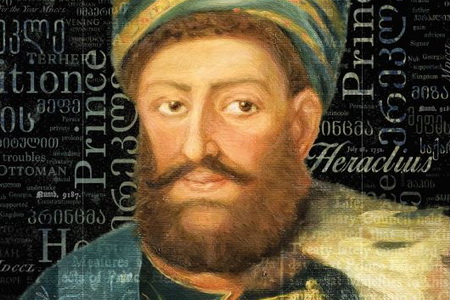18th century British press notes on Georgian king to be unveiled in new book

British newspaper reports introducing their 18th century readers to one of Georgia’s last monarchs are becoming available to the Georgian public for the first time through a new print collection, set to be unveiled by Tbilisi’s Art Palace museum venue on Friday.
In the book titled King Erekle in English and Irish Press, researchers have collected notes and articles on King Erekle II (also known as Heraclius II) originally published in Britain.
Why did the [British] papers talk about [the Georgian king’s] studies at the Royal Military Academy of Woolwich? What were the circumstances Georgia faced when signing the [1783] Treaty of Georgievsk [with the Russian Empire]? And why did ambassadors sent from Tbilisi to Europe die in suspicious circumstances?”
These questions are answered by the formerly unknown historical sources [obtained in Britain]”, Art Palace presentation organisers said in their preview of this week’s event.
The project for the publication has resulted in a translation of over 200 historical notes from the 18th century press, preserved at the National Library of Ireland.
Originally printed by nearly 30 British papers including British Evening Post, London Evening Post and Lloyd’s Evening Post, the sources are now published in Georgian and English with relevant comments by researchers.
They concern the "successful military and political career” of the penultimate regent of the Georgian monarchy as well as his "pro-Western stance” and notable status in the world politics, Art Palace said.
The articles also illustrate the Georgian king’s "personal qualities, political achievements and military victories”, with other material concerning geopolitical circumstances facing Georgia in the 18th century as well as its "geography, culture and traditions”.
In the British press, King Erekle II is referred to as "the most experienced prince of the East" and a monarch dedicated to the principle of tolerance to all religions.
Born in 1720 in Telavi, in Georgia’s Kakheti province, he ruled the Kingdom of Kartli and Kakheti from 1762 to 1798.
The monarch succeeded in uniting eastern Georgia under the kingdom for the first time in three centuries, in the face of constant invasions from Persian and Ottoman armies.
The Georgian King scored a number of impressive military victories against invading forces but ultimately decided on an alliance with the Russian Empire to safeguard Georgia against further invasions in the long term.
However the treaty he signed with Russia in 1783 did not prevent Georgia from being left on its own against the devastating 1795 Persian invasion before Russia itself annexed Georgia in 1801, three years after his death.
 Tweet
Tweet  Share
Share